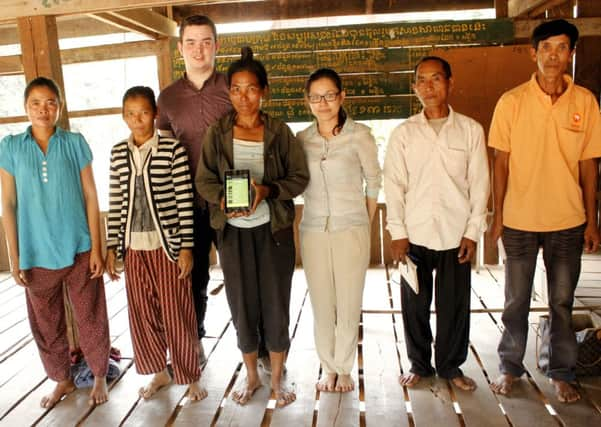Scots student’s app picked by UN to help farmers


Named after the Greek god of vegetation, the Attis app was designed by Edinburgh Napier University computing undergraduate Neil Stewart to give smallholders in south-east Asia access to vital agricultural information at their fingertips.
Stewart, who was born in South Africa but grew up in East Lothian, was chosen to develop the new Android technology as part of a voluntary project for the United Nations Food and Agriculture Organisation (FAO).
Advertisement
Hide AdAdvertisement
Hide AdThe app, which can be used on smartphones and tablets, is due to be trialled in remote areas of Cambodia. If it proves successful, development workers hope the technology can be rolled out in other places.
“Cambodia is a challenging country for farming,” said FAO project manager Iean Russell, who is based in the north-western province of Siem Reap. “Farmers face floods, droughts, pests and diseases and are only now emerging into the modern era in terms of technology and wider markets. One of the long-term challenges for the improvement of farming systems in Cambodia has also been the lack of access to information. “With mobile phone coverage widespread and access to mobile phones high, Neil’s app has scope to rapidly improve this and has the potential to transform farming in Cambodia.”
The programme provides weather forecasts as well as information about crops such as soil-types, diseases and growing advice, with a messaging service letting farmers connect directly to agricultural experts.
Stewart, who graduates in July, said: “It’s really powerful to see technology we take for granted and normally only use for games and social media, being used in a way that could really change people’s lives. Farmers in Cambodia have to rely on collecting necessary information from infrequent training sessions run by development agencies or the limited resources of government agricultural services.
“Now, for example, if a farmer’s cucumbers are being attacked by insects, they could use the app to instantly find out what the insect is, how to get rid of it and what to do to stop it happening again.”
“Another example is weather. You or I can usually check our phones and the internet to easily see what it’s going to be like. But for them, they’ve got to look at the clouds and say it might rain tomorrow – which for a farmer is an extremely inaccurate way of planning their day.”
As well as access to growing advice, Attis uses GPS technology to find and map out markets. It can also pull up details about the type of produce being sold and prices. “This is really essential,” said Stewart. “It allows farmers to make educated decisions about how much they will sell their stock for and gives the farmer direct contact details for that buyer.”
The creative computing student went to Cambodia in October to meet some of the people who would be using the app. “I basically asked them what they would need, what do they need access to, what would enhance the way they work and what they don’t have access to at the moment,” said Stewart. “I came back to Scotland, developed the app over six months and then I went back again in March to show them where it was at.”